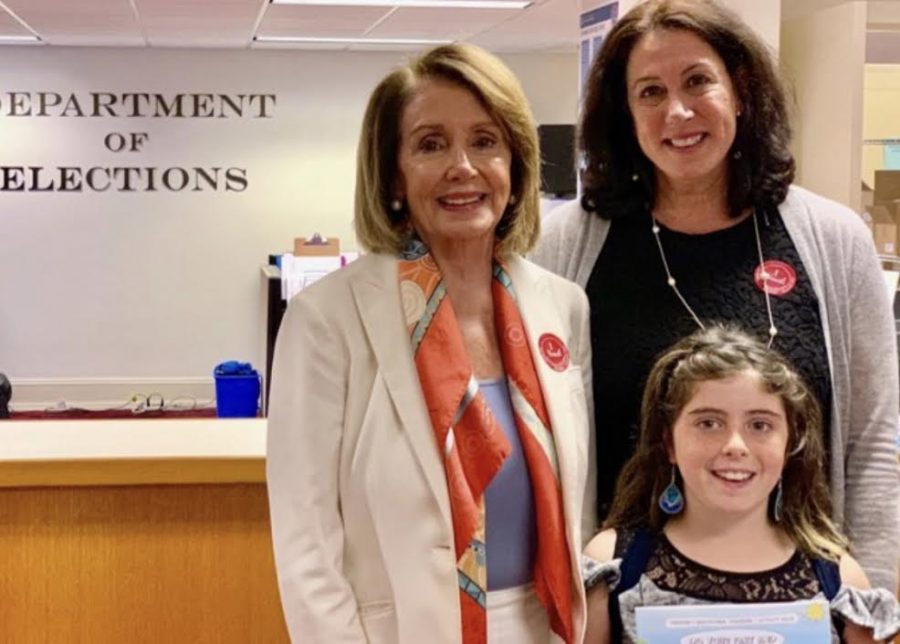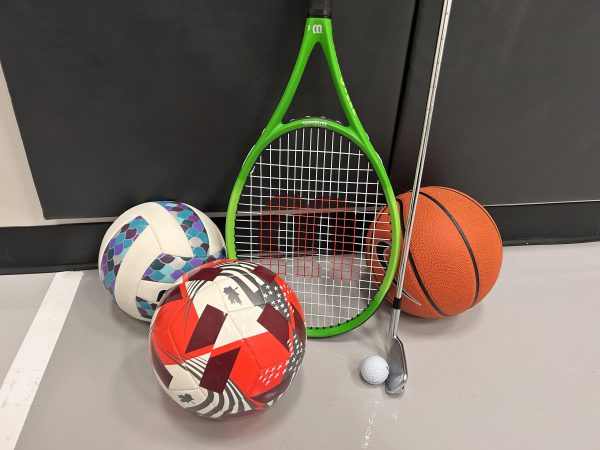Inside a conversation with Christine Pelosi
Christine Pelosi (right), wrote a book to share the best advice of her mother, Nancy Pelosi (left).
Picture Nancy Pelosi.
Is she standing, gavel-in-hand, in the House of Representatives, where she presides as Speaker? Or perhaps she’s cocooned in her red coat, exiting the West Wing of the White House with her sunglasses on? Or maybe she’s seated at a conference table, surrounded by hostile (and mostly male) members of the Trump Administration, who seem to look at her with a mixture of disgust and fear? This is Nancy Pelosi as America understands her: the most powerful woman in politics, fixture of newspaper headlines and cable news chyrons, as divisive as she is iconic.
Now picture Nancy Pelosi tethered to a phone cord and winding all around her house.
Allow her daughter, Christine Pelosi, to explain:
“We had a super, super long phone cord in our kitchen. So, she would start at the base of the phone and dial the number by the wall, which was adjacent to the laundry room. She’d be doing a load of laundry, then she’d move out to the dishes, then out further to the stove, then all the way across the room to the kitchen table, to the side part of the kitchen table where there was a little couch where we would sit and watch TV, all the way out to the back porch where she would keep an eye on things.” Christine pictures her mother this way, before the days of smartphones, when scrolling through your device as you go about your day is as natural as breathing, finding a way to hack her home in order to multitask. “It was rather innovative for her to have this very, very long cord so she could walk around and do all of these kitchen tasks and also keep an eye on all five of us and make sure that people were doing what they were supposed to be doing and more important, weren’t doing what they weren’t supposed to be doing.”
An attorney and advocate for We Said Enough, Christine Pelosi, 53, is also the author of The Nancy Pelosi Way, about female empowerment and leadership. She wrote it over the summer, “very, very quickly” and primarily in the notes section of her iPhone. And she wrote it without any direct input from Nancy Pelosi herself, since House rules dictate that members can’t involve themselves in projects from which immediate family members may profit. “She’d say, ‘How’s the book?’ And I’d say, ‘Oh, it’s coming along great.’” The lack of information and control over the project was a source of “frustration” for her mother, Christine said, but a “delight” for the author—though, obviously, this isn’t some kind of juicy tell-all. Christine loves and admires her mother and maintains a close relationship with her. When her mother noted that the book cast her in a “very positive” light, Christine basically replied, duh. “Let somebody who doesn’t like you write their own book,” Pelosi said, “but I’m not going to write a book that criticizes you.”
Her obvious acknowledged bias towards her subject makes the book valuable in its own way. Who better to provide genuine insight into one of America’s most interesting political figures—love her or hate her—than someone literally raised by her? Christine has had a front-row seat to the democratic process since childhood, whether being brought along to volunteer in the community with her mom, or attending events once she was elected Northern Chair of the California Democratic Party and then, in 1981, State Chair. By 1987, when Pelosi was first elected to Congress, Christine was 21 years old, meaning her entire childhood, her formative years, were lived observing Nancy Pelosi in relative obscurity, as she inched toward power. Nancy Pelosi the meme, the caricature, the hero or the villain, did not come until much later.
“Just as some boys naturally follow their dads to work and think, ‘Oh this is interesting, maybe I’ll do this.’ I always followed my mom,” Christine said. “It’s obviously impossible to imagine my life without her being such a strong advocate and since I was rather argumentative from an early age, people always said, ‘Oh you’ll be an attorney.’ Which now seems very logical, but at the time when I was five years old… and it was the early 1970s, that actually wasn’t something people said to a little girl. But my parents said it to me… The value [my parents] placed on education as a pathway to success and the fact they wanted that as much for their four daughters as for my brother, really said a lot about their effects on us… for them to just assume that their daughter would be in grad school and be an attorney if she applied herself, I think was something extraordinarily feminist.”
For them to just assume that their daughter would be in grad school and be an attorney if she applied herself, I think was something extraordinarily feminist. — Christine Pelosi
In Pelosi’s book, she focuses on including a combination of serious and more lighthearted advice. She wrote about what Speaker Pelosi’s grandchildren call the “Mimi-isms,” which include things such as “Never date a cheap man––if he’s cheap with his money, he’s cheap with his emotions, and he’s cheap with his love.” Or “On going out in a slobby outfit: What are you saving your good clothes for?” and “You don’t always have to set the world straight. You can be right, but you don’t always need to gloat about it. There’s a better way to say it in a nicer way.” Yet, there are moments of seriousness throughout that are focused on empowering women and giving advice on how to pursue leadership roles. “The whole point of the book was to share [my mom’s] lessons on leadership and success. Obviously, personal success is the most important thing: being happy, being loved, loving other people, being interesting and interested. Those are the hallmarks of personal success, being dedicated to something bigger than yourself, obviously, those are the lessons that I wanted to share,” Christine said. “I did think that it’s important also for people to see that the same bits of advice you give at home are the ones that by and large, you ought to be giving at work. The same moral code that you have at home, with the people you care about the most, your children, your grandchildren, would be the same kind of modeling you’d want to do for the public. For a woman who always says that she sees her work in politics as an extension of her work as a mother, I thought it was important for people to see the consistency between the advice that she gives us and the advice she gives her colleagues.”
That’s the most important thing: to not only be your own authentic self but to hold space for other people to be their authentic selves. — Christine Pelosi
Unsurprisingly, she believes that women run the world. “We rock the cradle, we rule the world. We have so much influence over our children, over our loved ones, over our families, and we ought to have the same amount of influence in public life,” Christine said. “People will say… ‘I love strong women. My mom was strong, my daughters are strong, my wife is strong.’ Yet, some of those same people don’t accept that same power when it comes from a professional cohort or when it comes from a political leader… I asked [my mom] about that at an Ignite Young Women lead event… and she said… ‘There used to be this argument: if I get it, you can’t get it. But really, now people are being a lot better about that and realizing the more women succeed, the more women can succeed.’ It’s important to not only have the confidence to stand up for yourself but also to get used to speaking your ideas and giving people credit for their ideas because the more women who speak up, the more voices are being heard and more people will be used to hearing advice and ideas and contributions from women.”
Among all this advice, the best piece of advice that Pelosi ever received from her mother was told to her when she first came to DC to work at the Department of Housing and Urban Development during the Clinton Administration.“Just be yourself and believe in what you’re doing because it’s really, really hard and you only do this once. So you might as well believe in yourself and what you’re doing and have integrity about what you’re doing…You’re there to make a difference, and if you can’t make a difference, make an impression. You may not win; you probably won’t win everything, but if you keep moving on a path and making a good impression, you can bring more people with you.’ That’s the most important thing: to not only be your own authentic self but to hold space for other people to be their authentic selves,” Pelosi said.


















































